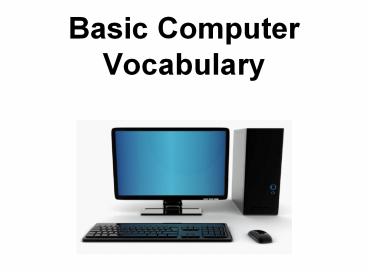Basic Computer Vocabulary - PowerPoint PPT Presentation
1 / 13
Title:
Basic Computer Vocabulary
Description:
terms to know personal computer cpu bit & byte hardware input & output ram & rom storage device software operating system network personal computers a personal ... – PowerPoint PPT presentation
Number of Views:146
Avg rating:3.0/5.0
Title: Basic Computer Vocabulary
1
Basic Computer Vocabulary
2
TERMS TO KNOW
PERSONAL COMPUTER
CPU
BIT BYTE
HARDWARE
INPUT OUTPUT
RAM ROM
STORAGE DEVICE
SOFTWARE
OPERATING SYSTEM
NETWORK
3
PERSONAL COMPUTERS
- A personal computer is used by one person at a
time. Includes desktop and laptop computers, MP3
players, PDAs, etc. - PC Microsoft Windows OS (made by IBM, Dell,
Gateway...) - Mac Mac OS (made only by Apple)
4
CENTRAL PROCESSING UNIT (CPU)
- CPU computers brain
- The CPU performs calculations and carries out all
the instructions you give to your computer - CPU speed is measured in
- Megahertz (MHz) - millions of CPU cycles per
second - Gigahertz (GHz) - billions of CPU cylcles per
second
For a short video about the inside of your
computer, click here.
5
BITS BYTES
- Computers can only process two numbers 1 and 0.
- A bit is the smallest unit of information, always
either a 1 or a 0. - Eight bits make a byte
- 5 page paper 40 KB (40,000 bytes)
- Movie on DVD 5 GB (5 billion bytes)
6
HARDWARE
- Hardware is the collection of physical devices
that make up your computer system. These devices
are also called components.
7
INPUTS OUTPUT PORTS
- Types of Ports
- USB
- Firewire
- Compact Flash (CF Card)
- Secure Disk (SD Card)
- Input user enters information into a computer
- Output computer delivers information back to a
user
8
Hmmm......
- Is it an input or output?
- keyboard
- mouse
- printer
- scanner
- speakers
- digital camera
- Q What are 3 hardware components that you can
see outside the computer and what are 3
components hidden inside the computer?
9
RAM ROM
- A computer mainly uses 2 kinds of memory RAM or
ROM, depending on the task - ROM permanent information, long-term memory
- RAM temporary information, short-term memory
(erased when computer turns off)
RAM computer chips
10
STORAGE DEVICES
Storage devices hard drive flash drive
CDs, DVDs, Blue-ray floppy disk
- A computer stores information in 3 main places
RAM, ROM, or storage device - Before you save your work, the data is stored in
RAM. When you save a file, you move the
information from RAM to a storage device.
How is RAM like short-term memory? If you had a
1GB file, where could you store it?
11
SOFTWARE
- Software is a set of instructions that makes it
possible for your computer to perform tasks. It
translates your commands into the language of
binary numbers. Software can also be called a
program or an application.
3 categories of software Operating System
(OS) Application Utility
Types of Software web browsers email
word processing spreadsheet database
presentation
12
OPERATING SYSTEMS
- The operating system controls all the software
programs and allows hardware to work properly.
Types of operating systems Microsoft
Windows Mac OS Linux Handheld OS (PDAs MP3s,
Cell Phones, etc.
MS-DOS text interface (old school way of
input) GUI graphical user interface that
allows for point and click
Name 6 types of application software and describe
what each one allows you to do. What types of
software program controls all the other software
on your computer?
13
NETWORK
- A computer network is a group of computers
connected together. Networks allow people to
share information and resources such as printers,
storage devices, and Internet connections. - A network server is a powerful computer that lets
users share storage space and applications
In a computer network, what do you call the
computer that provides shared storage space and
applications to other computers? Why is it
helpful for schools or companies to use a network?































